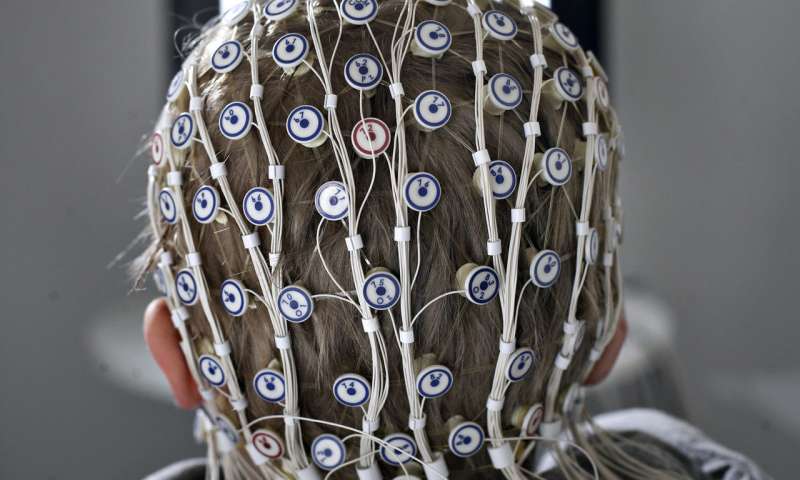Using more than 100 measuring points across the scalp, EEG displays brain functions with millisecond accuracy. Credit: Petteri Kivimäki
After their first year of life, infants' perception of phonemic contrasts usually becomes more specialised and adapted to their lingual environment, and they lose perceptual sensitivity to phonemic contrasts irrelevant in this respect. This phonemic specialisation is known to be important for early language development. Whether this specialisation process is still relevant at school age was examined in a recent joint study by the University of Jyväskylä and Yale University.
Comparison of brain event-related potentials between Finnish and English phoneme contrasts showed clear response patterns. In English speaking children from the United States, a strong brain response to foreign language contrasts was associated with poorer reading skills. No such associations were found for the English language contrasts in the English speakers or in the Finnish speakers for the phonemic contrasts of either language.
"The result for the Finnish children is not surprising, as Finnish children are exposed to spoken English on a daily basis and therefore English phonemes are fairly familiar to them already at the age of 10 to 12 years," says researcher Jarmo Hämäläinen from the Department of Psychology, University of Jyväskylä, Finland.
These results confirm the idea that perceptual specialisation to the phonemes significant in one's lingual environment supports not only the language development of children but also reading skills acquisition. The finding of a stronger response to consonant length contrasts (important in the Finnish language) in the English-speaking children with poorer reading skills suggests that deficiencies in the specialisation process for speech sound perception can affect reading skills acquisition at school.
The findings are an important step in understanding the causes of reading problems and also in understanding the development of reading skills in general.
The study involved 10- to 12-year-old children from Finland and 5- to 12-year-old children from the United States. They participated in reading skills tests and EEG recordings. EEG was recorded in response to English phonemic contrasts of place of articulation (ba, da, ga) and to Finnish phonemic contrasts of consonant length (ata, atta).
More information: Jarmo Hämäläinen et al. Brain event-related potentials to phoneme contrasts and their correlation to reading skills in school-age children, International Journal of Behavioral Development (2017). DOI: 10.1177/0165025417728582
Provided by University of Jyväskylä





















